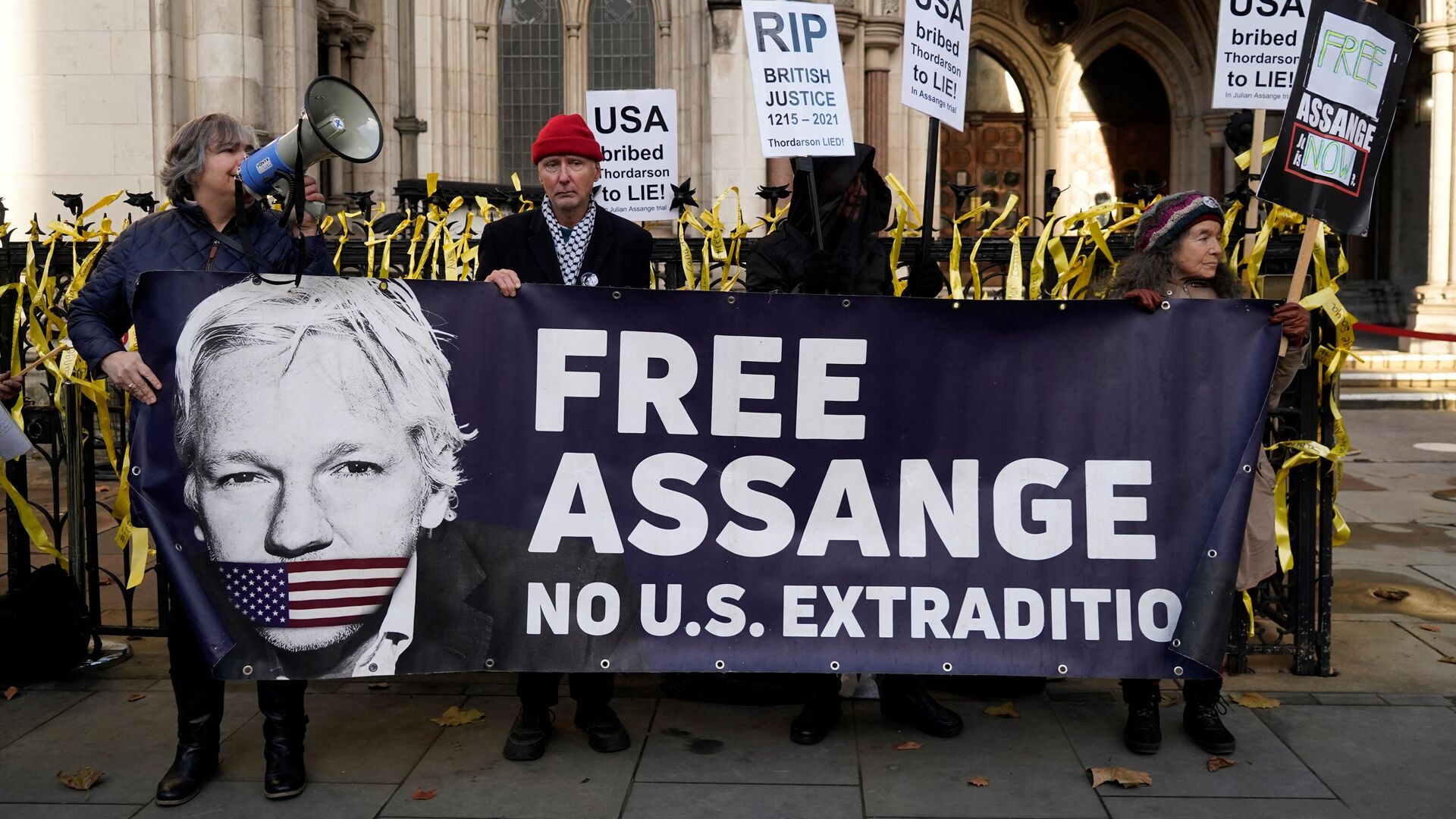https://sputnikglobe.com/20220314/wikileaks-julian-assange-denied-right-to-appeal-extradition-decision-to-uk-supreme-court-1093869242.html
WikiLeaks' Julian Assange Denied Right to Appeal Extradition Decision to UK Supreme Court
WikiLeaks' Julian Assange Denied Right to Appeal Extradition Decision to UK Supreme Court
Sputnik International
The US Department of Justice unveiled in 2019 a series of 18 charges against WikiLeaks co-founder Julian Assange, accusing him of violating the Espionage Act... 14.03.2022, Sputnik International
2022-03-14T17:01+0000
2022-03-14T17:01+0000
2022-11-03T18:18+0000
julian assange
uk supreme court
extradition
wikileaks
https://cdn1.img.sputnikglobe.com/img/07e5/0c/0a/1091415757_0:320:3073:2048_1920x0_80_0_0_1cd1f9de8a4f756ccf9702ffcbaf6460.jpg
The UK Supreme Court has denied Assange's appeal of a December 2021 decision by the London High Court to allow his extradition to the United States. The decision now falls to UK Home Secretary Priti Patel to authorize the extradition, WikiLeaks said in a Twitter statement.According to a statement by Birnberg Peirce, Assange's solicitors, the Supreme Court decided that "the application does not raise an arguable point of law."The DOJ has accused Assange of violating the 1917 Espionage Act because WikiLeaks printed documents revealing US war crimes in Iraq, including a 2007 incident in Baghdad in which a US Army helicopter was filmed shooting unarmed civilians, including two Reuters journalists, which the Pentagon had tried to cover up. The video, along with a slew of other documents, was found and given to WikiLeaks by then-US Army analyst Chelsea Manning, who was sentenced to 35 years in prison for doing so in 2013. Manning was later pardoned in 2017 by outgoing US President Barack Obama.In January, the high court decided to allow Assange to appeal their decision to the Supreme Court. The high court had hesitated at first to extradite Assange due to conditions in US prisons, initially rejecting the US request before granting it following an appeal by the Biden administration.
Sputnik International
feedback@sputniknews.com
+74956456601
MIA „Rosiya Segodnya“
2022
Sputnik International
feedback@sputniknews.com
+74956456601
MIA „Rosiya Segodnya“
News
en_EN
Sputnik International
feedback@sputniknews.com
+74956456601
MIA „Rosiya Segodnya“
Sputnik International
feedback@sputniknews.com
+74956456601
MIA „Rosiya Segodnya“
julian assange, uk supreme court, extradition, wikileaks
julian assange, uk supreme court, extradition, wikileaks
WikiLeaks' Julian Assange Denied Right to Appeal Extradition Decision to UK Supreme Court
17:01 GMT 14.03.2022 (Updated: 18:18 GMT 03.11.2022) The US Department of Justice unveiled in 2019 a series of 18 charges against WikiLeaks co-founder Julian Assange, accusing him of violating the Espionage Act by publishing classified US documents.
The UK Supreme Court has denied Assange's appeal of a
December 2021 decision by the London High Court to allow his extradition to the United States. The decision now falls to UK Home Secretary Priti Patel to authorize the extradition, WikiLeaks said in a
Twitter statement.
According to a statement by Birnberg Peirce, Assange's solicitors, the Supreme Court decided that "the application does not raise an arguable point of law."
"We regret the opportunity has not been taken to consider the troubling circumstances in which requesting states can provide caveated guarantees after the conclusion of a full evidential hearing,"
the legal firm said. "In Mr. Assange's case, the court had found that there was a real risk of prohibited treatment in the event of his onward extradition."
The DOJ has accused Assange of violating the 1917 Espionage Act because WikiLeaks printed documents revealing US war crimes in Iraq, including a 2007 incident in Baghdad in which a US Army helicopter was filmed shooting unarmed civilians, including two Reuters journalists, which the Pentagon had tried to cover up. The video, along with a slew of other documents, was found and given to WikiLeaks by then-US Army analyst Chelsea Manning, who was sentenced to 35 years in prison for doing so in 2013. Manning was later pardoned in 2017 by outgoing US President Barack Obama.
Assange faces 18 charges in the US that could give him a maximum sentence of 175 years in prison. He has already served three years in London's Belmarsh Prison while awaiting extradition, where he has faced conditions that United Nations Special Rapporteur on Torture and other Cruel, Inhuman, or Degrading Treatment or Punishment
Nils Melzer described as psychologically torturous.
In January, the high court decided to
allow Assange to appeal their decision to the Supreme Court. The high court had hesitated at first to extradite Assange due to conditions in US prisons, initially rejecting the US request before granting it following an appeal by the Biden administration.



